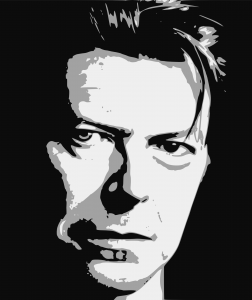 David Bowie may be dead, but when we’re in midlife, his challenge to “turn and face the strain” has never been more alive. Midlife is full of change and accompanying strain. Midlife has the potential to include 7 of the top 10 life changes that we’ll experience such as career move, kids arriving or leaving, divorce, or relocating. It’s important to recognize that while your situation may be unique to you, you’re not alone in the general sense that this is just how life works. In midlife changes are inevitable.
David Bowie may be dead, but when we’re in midlife, his challenge to “turn and face the strain” has never been more alive. Midlife is full of change and accompanying strain. Midlife has the potential to include 7 of the top 10 life changes that we’ll experience such as career move, kids arriving or leaving, divorce, or relocating. It’s important to recognize that while your situation may be unique to you, you’re not alone in the general sense that this is just how life works. In midlife changes are inevitable.
In midlife, changes are inevitable
Hey, didn’t you just say that?! Yeah, and let me say it again … in midlife changes are inevitable!
Humans have understood that change is natural and inevitable since the early days of humanity. Cliché as they may seem, oft heard sayings from the antiquities affirm this valuable truth …
The only thing that is constant is change. ― Heraclitus
There is a time for everything, and a season for every activity under the heavens: ― Ecclesiastes 1:3
 Life is a series of natural and spontaneous changes. ― Lao Tzu
 Shit happens. ― Forrest Gump
… but how we deal with change internally determines our ability to successfully address and adapt to the external realities of those changes.
In his excellent and time-honored bestseller Transitions, William Bridges offers up a solid framework for understanding how to successfully navigate the challenging times in our life.
But before he provides the framework, he establishes the important distinction between change (that which is external or beyond our control, like national economics or aging) and how we transition through (our making sense of and coming to terms with) the change.
Bridges suggests that our internal experience of change, or transition, occurs in three phases: Endings, The Neutral Zone, and The New Beginning. This blog post is going to cover the first of these three, with subsequent posts exploring the other two.
Every transition begins with an ending
It’s a pretty simple idea on the surface. With external changes it’s usually easy to see when the old way has shifted into a new beginning either by choice or by situations beyond our control.
But often we haven’t let go of the old things, habits, or mindsets associated with that old way, especially if that transition is sudden or unexpected. Internally we haven’t completed the process of letting go. And herein lies:
- a morass of ambiguity (what’s my relationship with the past and why can’t I let go?)
- endless questioning (Oh my god, what has happened? Who am I? Was that really a good decision?), and
- loss of self (especially if we really identified with who we were in that previous role/place/relationship).
Here’s the thing … everyone finds endings difficult and we all deal with them differently. But by not dealing with endings effectively we don’t allow what’s next to come into being. Ya know, like if the caterpillar’s insides were like, “Nope, I ain’t doing that butterfly thing because I’m a caterpillar.”
No I didn’t … did I just use a caterpillar metaphor in a blog for men in midlife? Yes, it’s okay, there are boy butterflies too, so get over it.
Dealing with endings and midlife changes
And being the intelligent man that you are, you’re now asking yourself, how can I effectively deal with endings? And here’s where men often face the biggest challenge with endings and the change that they bring … you’ve got to go inside and get an understanding of your relationship to the change.
A first step is asking self-defining questions like:
- What were my assumptions about myself or others before, and what are they in the new condition?
- What did I believe about myself in the old situation, and what must I believe about myself in the new situation?
- What’s true now, and what am I making up or unable to let go of about the past or future?
By being curious about what has changed or ended and what’s current reality, you begin to peel back the layers and get at what is true.
To support you through an ending there are other important things you can do … ’cause after all, we are men and must DO SOMETHING:
- Take care of your body by eating right, getting exercise, and getting enough sleep
- Identify what part you control and let go of what you can’t
- Take control of the storyline by dealing with those internal saboteurs that keep you from getting at the truth in what’s happening in the ending (Check out my post on this topic.)
- Stay curious: about what’s happening, what’s the learning, what else might be going on here
- Manage your stress (see numbers 1 and 4 above)
- Find support and don’t go it alone
I hope this post has provide some useful information for your midlife transition. Stay tuned for future blogs where I’ll cover the remaining two stages that Bridges identifies: the Neutral Zone and New Beginnings. I look forward to seeing you soon at the corner of Midlife and Thriving!
Have you recently dealt with an Ending in your life? If so, how did you deal with it and what tools or tricks did you use to get through it? Let me know in the comment section below!


Recent Comments